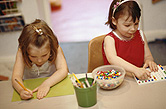- Could Your Grocery Store Meat Be Causing Recurring UTIs?
- Are You Making This Expensive Thermostat Error This Winter?
- Recognizing the Signs of Hypothyroidism
- 10 Strategies to Overcome Insomnia
- Could Artificial Sweeteners Be Aging the Brain Faster?
- Techniques for Soothing Your Nervous System
- Does the Water in Your House Smell Funny? Here’s Why
- Can a Daily Dose of Apple Cider Vinegar Actually Aid Weight Loss?
- 6 Health Beverages That Can Actually Spike Your Blood Sugar
- Treatment Options for Social Anxiety Disorder
Child’s Popularity May Rely on Understanding Others


Children who are tuned in to what others want, think and feel are more popular in school than those who aren’t as good at understanding others, a new review indicates.
“Our study suggests that understanding others’ mental perspectives may facilitate the kind of interactions that help children become or remain popular,” said review leader Virginia Slaughter, head of the psychology department of the University of Queensland in Australia.
For the report, published April 15 in the journal Child Development, researchers analyzed 20 studies that included nearly 2,100 children aged 2 to 10 in Asia, Australia, Europe and North America.
The strength of the link between being able to figure out what others think and feel and popularity was similar for preschoolers and older children. This suggests that this ability is important for making friends at an early age and maintaining friendships as children get older, Slaughter said.
“Our findings suggest that training children to be sensitive to others’ thoughts and feelings may improve their relationships with peers,” Slaughter said in a journal news release. “This may be particularly important for children who are struggling with friendship issues, such as children who are socially isolated.”
The researchers also found that this link was weaker among boys than girls, which may reflect gender differences in how children relate to one another. Girls’ friendships often feature higher levels of closeness and conflict resolution, which may mean they need to be better at understanding others’ thoughts and feelings, the investigators said.
More information
The American Academy of Pediatrics has more about children and friends.
Source: HealthDay
Copyright © 2026 HealthDay. All rights reserved.










